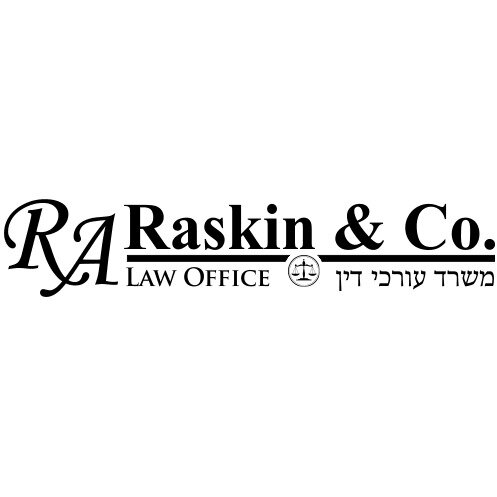Best Art & Cultural Property Law Lawyers in Haifa
Share your needs with us, get contacted by law firms.
Free. Takes 2 min.
List of the best lawyers in Haifa, Israel
About Art & Cultural Property Law in Haifa, Israel
Art & Cultural Property Law in Haifa, Israel encompasses a range of legal issues related to the protection, ownership, and transfer of art and cultural heritage items. Given Haifa’s rich historical backdrop and vibrant art scene, the city is a hub for artists, collectors, museums, and cultural institutions. The law in this field aims to safeguard cultural treasures, regulate the art market, and ensure ethical practices when dealing with artworks and cultural property.
Why You May Need a Lawyer
Engaging with Art & Cultural Property Law may require legal assistance in various scenarios. For instance, artists and creators may seek advice on intellectual property rights to protect their works, while collectors might need guidance when purchasing art to ensure authenticity and legal ownership. Museums and cultural institutions often require legal expertise for the acquisition, loan, or repatriation of artworks. Additionally, individuals or entities involved in international art transactions must navigate complex regulations governing import and export.
Local Laws Overview
In Haifa, as in the rest of Israel, several key legal frameworks and statutes regulate Art & Cultural Property Law. These include the Israel Antiquities Law, which oversees the protection of ancient artifacts, and the Copyright Act, which protects the intellectual property rights of creators. The Planning and Building Law may also come into play concerning the preservation of historical sites. Understanding these laws is crucial for anyone involved in the creation, acquisition, or management of art and cultural property.
Frequently Asked Questions
What rights do I have as an artist under Israeli law?
Artists in Israel have rights under the Copyright Act, which provides protection for original works, ensuring that creators can control the use and distribution of their art.
Are there any restrictions on exporting art from Israel?
Yes, there are regulations governing the export of artworks, particularly those considered cultural property or antiquities. Legal advice is recommended to ensure compliance with these regulations.
How can I verify the authenticity of an artwork before purchase?
To verify authenticity, you should consult with experts, review provenance documents, and potentially seek legal advice. Due diligence is crucial to avoid fraudulent transactions.
What should I know about importing art into Israel?
Importing art into Israel involves navigating customs regulations and ensuring that the items comply with local laws. Legal guidance may be necessary to manage these processes and avoid legal pitfalls.
Who regulates archaeological finds in Haifa?
The Israel Antiquities Authority is responsible for regulating archaeological excavations and findings, ensuring that heritage sites and artifacts are preserved and protected.
What is the process for repatriating cultural artifacts?
Repatriation typically involves legal negotiations and documentation. It is guided by both local laws and international agreements regarding the return of cultural property.
Can I protect my art from being copied by others?
Yes, copyright law provides mechanisms to protect your art from being unlawfully copied. Registering your work can enhance protection and facilitate enforcement of your rights.
How do I resolve disputes related to art ownership?
Art ownership disputes can be resolved through negotiation, mediation, or legal action. Engaging a lawyer experienced in art law is advisable for navigating these issues.
What are moral rights in Israel's copyright law?
Moral rights in Israel safeguard an artist's personal connection to their work, ensuring that their creation cannot be altered without consent and is properly attributed to them.
Are there any grants or funding available for art projects in Haifa?
Yes, various governmental and private organizations offer grants and funding for art projects. Research and application to these programs can provide valuable support.
Additional Resources
For more information, individuals can consult several resources, including the Israel Antiquities Authority for matters related to archaeological interests and the Israeli Center for the Promotion of Art for artists' rights. Local museums and legal firms specializing in art law are also valuable sources of information and guidance.
Next Steps
If you need legal assistance in Art & Cultural Property Law in Haifa, consider contacting a specialized law firm. Schedule a consultation to discuss your specific needs and circumstances. Gathering all relevant documentation and outlining your objectives can help in obtaining tailored legal advice. Always ensure that the legal expert you choose has experience and knowledge of both local and international art law.
Lawzana helps you find the best lawyers and law firms in Haifa through a curated and pre-screened list of qualified legal professionals. Our platform offers rankings and detailed profiles of attorneys and law firms, allowing you to compare based on practice areas, including Art & Cultural Property Law, experience, and client feedback.
Each profile includes a description of the firm's areas of practice, client reviews, team members and partners, year of establishment, spoken languages, office locations, contact information, social media presence, and any published articles or resources. Most firms on our platform speak English and are experienced in both local and international legal matters.
Get a quote from top-rated law firms in Haifa, Israel — quickly, securely, and without unnecessary hassle.
Disclaimer:
The information provided on this page is for general informational purposes only and does not constitute legal advice. While we strive to ensure the accuracy and relevance of the content, legal information may change over time, and interpretations of the law can vary. You should always consult with a qualified legal professional for advice specific to your situation.
We disclaim all liability for actions taken or not taken based on the content of this page. If you believe any information is incorrect or outdated, please contact us, and we will review and update it where appropriate.









